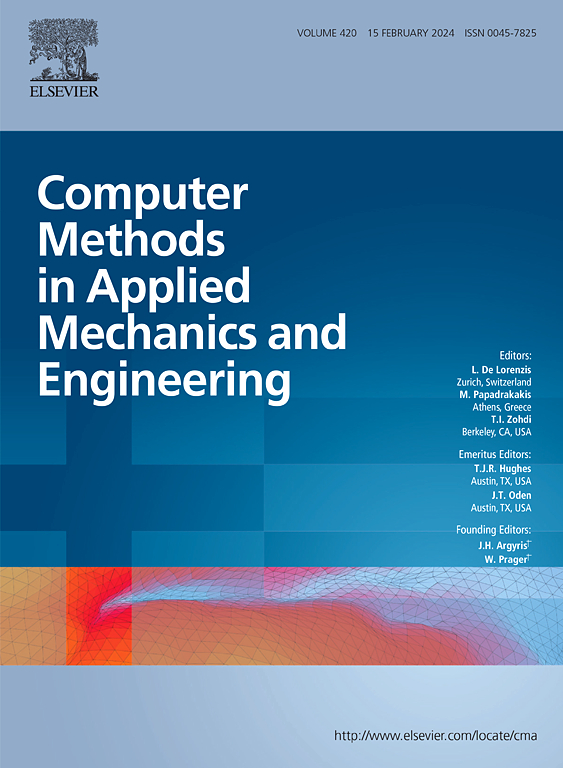Modelling of thermo-mechanical coupling effects in rock masses using an enriched nodal-based continuous-discontinuous deformation analysis method
IF 6.9
1区 工程技术
Q1 ENGINEERING, MULTIDISCIPLINARY
Computer Methods in Applied Mechanics and Engineering
Pub Date : 2024-11-16
DOI:10.1016/j.cma.2024.117543
引用次数: 0
Abstract
In this paper, the nodal-based continuous-discontinuous deformation analysis method (NCDDAM) is enriched to simulate the thermo-mechanical coupling effects in rock masses. A distance-based contact potential algorithm is first incorporated into NCDDAM to avoid the dependency of element shape and size on the calculation of contact force between different blocks. Then, three types of heat conduction models, which can deal with heat conduction in continuum and discontinuum, are incorporated into NCDDAM to simulate the heat conduction effects of rock masses. Finally, a two-way staggered algorithm is adopted in the context of NCDDAM to simulate the thermo-mechanical coupling effects in rock masses. Several benchmark examples are used to verify the correctness of the enriched NCDDAM in handling contact problems, heat conduction problems and thermo-mechanical coupling problems. The effects of time step size on the accuracy of NCDDAM for both thermal simulation and mechanical simulation are investigated detailly. In addition, the thermal cracking processes of rock masses for both experiment and engineering scales are simulated by the enriched NCDDAM. The numerical results indicate that the enriched NCDDAM is a powerful tool to simulate the thermo-mechanical coupling processes of rock masses.
利用基于丰富节点的连续-非连续变形分析方法模拟岩体的热-机械耦合效应
本文丰富了基于节点的连续-非连续变形分析方法(NCDDAM),以模拟岩体的热-机械耦合效应。首先在 NCDDAM 中加入了基于距离的接触势算法,以避免元素形状和尺寸对不同岩块之间接触力计算的依赖。然后,在 NCDDAM 中加入了三种热传导模型,可处理连续和非连续热传导,以模拟岩体的热传导效应。最后,在 NCDDAM 中采用了一种双向交错算法来模拟岩体的热机械耦合效应。通过几个基准实例验证了增强型 NCDDAM 在处理接触问题、热传导问题和热机械耦合问题时的正确性。详细研究了时间步长对 NCDDAM 热模拟和机械模拟精度的影响。此外,还利用增强型 NCDDAM 模拟了实验和工程尺度的岩体热裂解过程。数值结果表明,丰富的 NCDDAM 是模拟岩体热机械耦合过程的有力工具。
本文章由计算机程序翻译,如有差异,请以英文原文为准。
求助全文
约1分钟内获得全文
求助全文
来源期刊
CiteScore
12.70
自引率
15.30%
发文量
719
审稿时长
44 days
期刊介绍:
Computer Methods in Applied Mechanics and Engineering stands as a cornerstone in the realm of computational science and engineering. With a history spanning over five decades, the journal has been a key platform for disseminating papers on advanced mathematical modeling and numerical solutions. Interdisciplinary in nature, these contributions encompass mechanics, mathematics, computer science, and various scientific disciplines. The journal welcomes a broad range of computational methods addressing the simulation, analysis, and design of complex physical problems, making it a vital resource for researchers in the field.

 求助内容:
求助内容: 应助结果提醒方式:
应助结果提醒方式:


